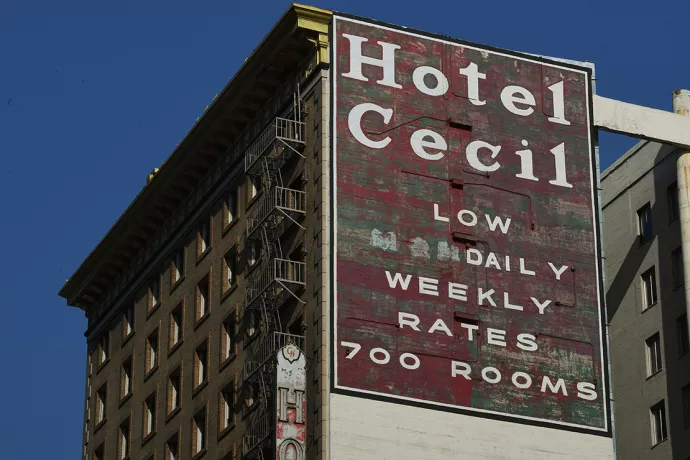
Murder and madness: UTM students explore infamous Cecil Hotel in new audio drama
Playwright and former University of Toronto Mississauga student David Yee took notice of the Cecil Hotel before he’d even heard a whisper of its sordid past. Looming over Downtown Los Angeles, it’s difficult to miss the 14-storey Beaux-Arts building, painted with the sign “Hotel Cecil/ LOW DAILY WEEKLY RATES/ 700 ROOMS.” When creative research directed Yee to finally take a peek into the lodging’s long history, he found a trail of deaths, disappearances and other eerie happenings stretching from its opening in the 1920s right to the present day. His “theatre brain” got excited, he says.
The Governor General's Award winner wrote the five-part audio drama the cecil hotel based on the backstory of this most infamous L.A. institution. The play, directed by frequent collaborator and Factory Theatre Artistic Director Nina Lee Aquino and featuring the fourth year students of the UTM and Sheridan College joint Theatre and Drama Studies program, premiered in February and is streaming free online until April 9. It is the first play produced out of the UTM Centre for New Theatre initiative, which invites professional playwrights into residence and commissions them to develop and mount new theatrical works in collaboration with Theatre and Drama Studies (TDS) students. After longer than a year of work, it is a freaky coincidence indeed that Yee’s gripping audio drama arrives simultaneous to the Netflix docu-series Crime Scene: The Vanishing at the Cecil Hotel, which has ignited new and widespread interest in the storied hotel’s grislier goings-on.
The audio series was actually born from another Yee original. Leading the class Developmental Dramaturgy with UTM associate professor Jacob Gallagher-Ross, Yee had built a theatrical work titled missing endangered, which focused on the guests and residents of the Cecil Hotel around the 2013 disappearance of 21-year-old Canadian Elisa Lam. The students had helped Yee imagine the characters and action they were to later portray on stage, but COVID scuttled any chance of the stage performance they’d envisioned. In just six weeks, Yee returned with another script — a companion piece or a prequel to missing endangered — which drew on his research about the hotel as well as components of the class’s developmental work and was designed specifically for the audio format. Through tales of murder, madness, hauntings and Faustian bargains set across the building’s many eras, the cecil hotel explores the past of not just this notorious address, but also the social history of Los Angeles and the United States in the 20th century.
Fourth year TDS student Christina Orjalo, who voices numerous roles in the audio drama, says she was “nervous” to work with artists as renowned as Yee and Aquino. But she quickly found the writer and director were “incredibly supportive.” “They understood that this was not the fourth year that we had been looking forward to, but there was so much team spirit, it never felt like we were alone.”
Alyssa Featherstone, another TDS student who acted in the cecil hotel, was thrilled by the experience. “We got to originate roles from a Governor General’s Award winner — and it was really, really fun.” She compliments Aquino especially for “creating such a lovely space to play and create in. As an actor,” she says, “to feel empowered in that way, it makes you feel like maybe I can make a life out of this.”
The inaugural project of the Centre for New Theatre wasn’t only beneficial to the students, however. “[The opportunity] allowed us to create the way we want to create — twice really,” says Yee. “It offered us not just the technical and human support, but a dramaturgical and an academic support as well, which engaged fully with our methodologies and our principles.”
Aquino, who hadn’t directed an audio drama before the cecil hotel, describes an environment where everyone involved was encouraged to push their boundaries. “The students were learning, but I was also learning.”
Fostering this symbiotic relationship is precisely the intent of the Centre for New Theatre, according to co-founders Gallagher-Ross and UTM associate professor Lawrence Switzky. “We think it's a wonderful thing for the life of the campus to have these artists with us for durational commitments that feed both the education of the students and the artistic practice of the artists,” Gallagher-Ross says.
“This is quite unusual within any university, particularly Canadian universities,” explains Switzky, “allowing students to have such an integral role in the workshopping process of a new work by major playwrights and directors. This is really important experience they’re getting.”
One of the centre’s models, Gallagher-Ross says, is Sheridan’s Canadian Music Theatre Project. The Broadway smash hit Come From Away began there as a workshop. “We want to do the same thing for new works of spoken theatre.”
